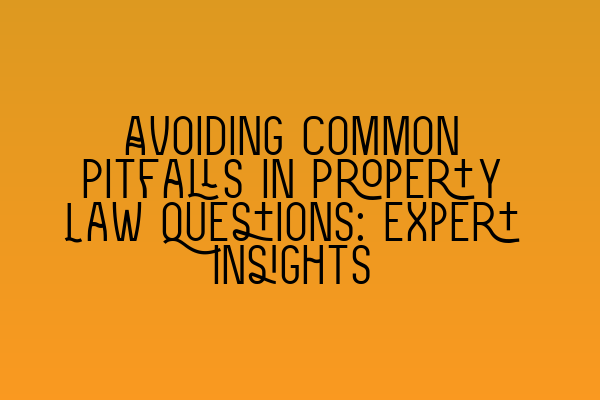Avoiding Common Pitfalls in Property Law Questions: Expert Insights
Welcome to SQE Property Law & Land Law, where our team of expert solicitors has decades of experience in property law. In this blog post, we will provide you with valuable insights on how to avoid common pitfalls in property law questions. Whether you are a law student studying for the SRA’s Solicitors Qualifying Examination (SQE) or a practicing solicitor looking to brush up on your property law knowledge, this article is for you.
Property law can be a complex and nuanced area of law, with its own set of rules and principles. It is important to have a solid understanding of the fundamental concepts in property law to avoid making costly mistakes in your practice or exams. Let’s dive into some expert insights on common pitfalls to avoid.
1. Failure to identify ownership interests accurately
One common pitfall in property law questions is failing to accurately identify ownership interests. It is crucial to identify the type of ownership interest involved in a property, whether it is freehold, leasehold, or commonhold. Each type of ownership interest comes with its own set of rights and responsibilities. Understanding these differences will help you answer questions with precision. If you want to test your knowledge and practice answering property law questions, check out our SQE 1 Practice Exam Questions.
2. Neglecting statutory rules and regulations
Another pitfall to avoid is neglecting the statutory rules and regulations that govern property transactions. It is important to stay up-to-date on relevant legislation, such as the Law of Property Act 1925, the Land Registration Act 2002, and the Housing Act 1988, among others. These laws establish the legal framework for property ownership, leasing, and transactions. Failing to consider these statutory rules can lead to erroneous answers and possible legal complications. To further enhance your understanding of property law, take a look at our SQE 2 Preparation Courses.
3. Inadequate consideration of easements and covenants
Easements and covenants are critical elements in property law that can often be overlooked or misunderstood. Easements grant rights over another person’s property, such as rights of way or rights to light, whereas covenants impose obligations or restrictions on property owners. Failure to consider easements and covenants can result in incorrect answers and a misinterpretation of legal scenarios. To practice answering questions on easements and covenants, try our SQE 1 Practice Mocks FLK1 FLK2.
4. Overlooking land registration requirements
In the digital age, land registration plays a vital role in property transactions. Registering land ensures its legal ownership is properly documented and provides certainty in property dealings. Failing to consider land registration requirements can lead to errors in answering questions related to transfers, leases, or mortgages. It is crucial to understand the process and implications of land registration, as outlined in the Land Registration Act 2002. For information on the latest SRA SQE exam dates, visit our article on SRA SQE Exam Dates.
By being aware of these common pitfalls and taking steps to avoid them, you can improve your performance in property law questions and enhance your legal practice. At SQE Property Law & Land Law, we believe in providing the best resources and support to help you succeed. To further refine your property law knowledge and skills, explore our SQE 1 Preparation Courses.
In conclusion, property law questions can be challenging, but with the right knowledge and preparation, you can avoid common pitfalls and excel in this area of law. Remember to accurately identify ownership interests, consider statutory rules and regulations, understand easements and covenants, and pay attention to land registration requirements. By doing so, you will enhance your understanding of property law and increase your chances of success in the SQE exams and your legal career.
For more practice and exam preparation resources, visit our related articles on SQE 1 Practice Exam Questions, SQE 1 Practice Mocks FLK1 FLK2, SQE 2 Preparation Courses, SQE 1 Preparation Courses, and SRA SQE Exam Dates.
As always, if you have any specific questions or need personalized guidance, our team of expert solicitors is here to help. Contact us at SQE Property Law & Land Law for professional and reliable assistance.
